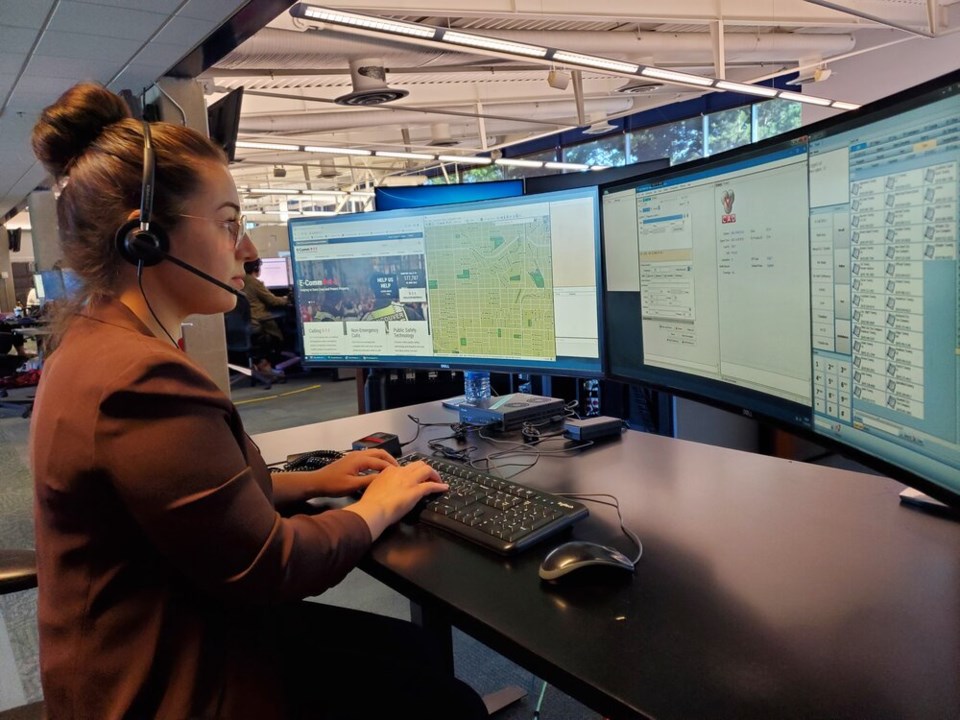Accidental 911 calls are increasingly flooding B.C.'s emergency lines, tying up operators in one out of five calls, says E-Comm.
The emergency service operator says that part of the rise is due to more people owning cell phones. In 2022, 79 per cent of 911 calls so far have come from a mobile device, up from 67 per cent in 2012.
In a written statement released by E-Comm, one police call taker described pocket dials where people are singing along to music or cheering at a sports event.
But even then, the operators need to call back to ensure there isn't an emergency.
Others call 911 by mistake and instinctively hang up the phone — which again requires the operator to check in to ensure the caller is safe.
"The important thing is to stay on the line and let us know so that we can ensure you are safe," one call taker said in a written statement.
E-Comm is asking the public to take the following steps to prevent accidental 911 calls:
- Lock and store your cellphone carefully when you're not using it
- Learn the different functions of your cellphone and smartwatch. For example, if you have enabled the "fall detection" or Emergency SOS functions, learn how they are triggered.
- If kids are playing with your phone, turn your device on airplane mode
- Do not program 9-1-1 into any phone.
- If you do call 9-1-1 by accident, do not hang up. Stay on the line so the call taker can ensure your safety.
City questions, is E-Comm worth it?
Amid climbing wait times, at least one B.C. city has raised concerns over whether their E-Comm bill is worth the steep price.
Discussion about E-Comm's value to Vancouver has been amplified and exposed by the pandemic, the ongoing overdose death crisis and climate change-fuelled tragedy, including last summer's heat dome.
In one case, Vancouver firefighters say they waited 11 hours for an ambulance crew to arrive and transport an elderly person suffering heat exhaustion to hospital. The BC Coroners Service reported 99 heat-related deaths in Vancouver between June 25 and July 1.
In 2021, the average wait time for non-emergency calls was approximately six minutes, but callers regularly experienced lengthy delays, often on hold for two hours or longer, according to a Vancouver Police Department report.
An explanation for those delays can be found in an 11 per cent increase in 911 calls in Vancouver from September 2020 to September 2021. That spike has meant non-emergency call-takers having to be reassigned to handle the volume of 911 calls.
E-Comm prioritizes the calls and assigns them to officers based on each call's risk to public safety. Most citizens are unaware that when they contact 911 and the VPD's non-emergency line, they are actually reaching E-Comm.
Calls that are medical in nature get transferred to B.C. Emergency Health Services, which is also experiencing a shortage of call-takers.
Before November 2021, 911 call-takers had to stay on the line with a caller requiring paramedics.
In November, E-Comm and B.C. Emergency Health Services management implemented a temporary procedure allowing 911 medical calls to be forwarded to BCEHS's automated system, thereby freeing up 911 call-takers sooner.
But for a union representing call takers, the biggest bottleneck comes from a lack of staff.
Donald Grant, president of the Canadian Union of Public Employees Local 8911, represents about 550 call-takers, 911 operators and dispatchers connected to 33 police agencies and 40 fire departments.
As Vancouver city council debated the value of E-Comm's $24 million annual bill this spring, Grant pointed to a PricewaterhouseCoopers report calling for the immediate addition of 125 full-time call-takers to meet E-Comm's emergency and non-emergency demands.
"It confirmed what we knew, but to a tune of a number that we didn't expect," told Glacier Media.
With files from Mike Howell



